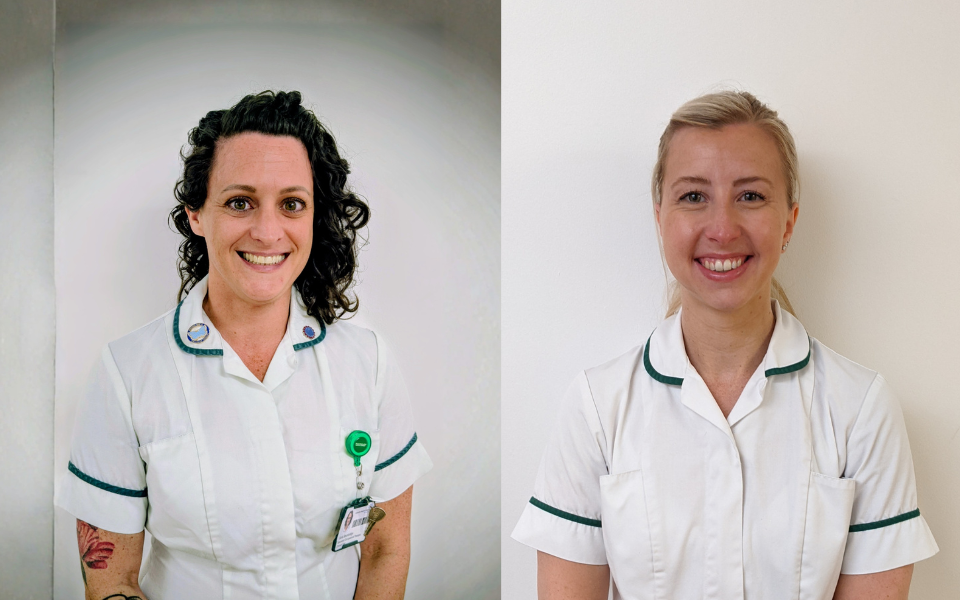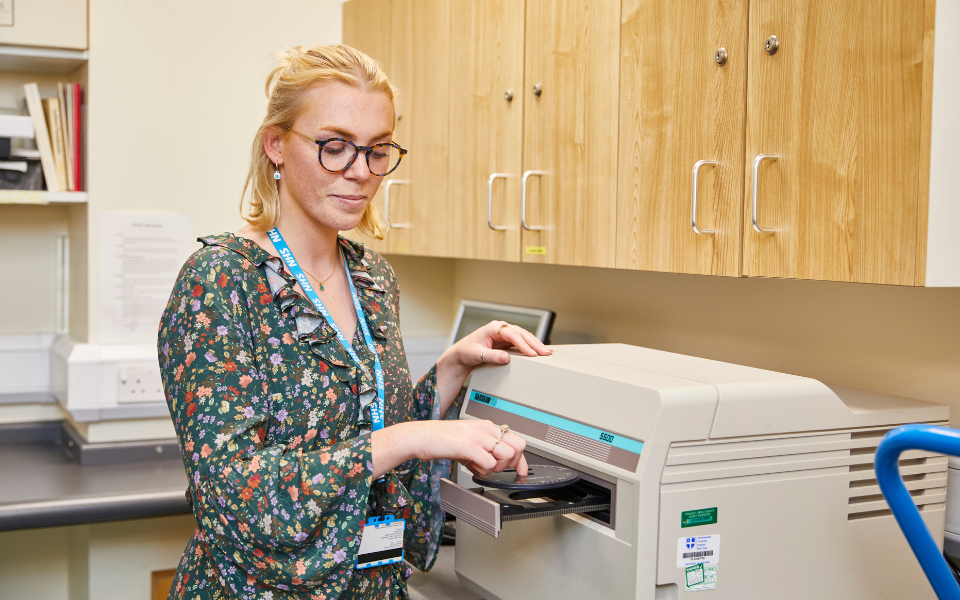
Healthcare science
Transforming Lives Through Science: A Senior Dosimetrist’s Story
Science has the power to change lives, and nowhere is that more evident than in healthcare. Behind every precise treatment and every patient success story, there are dedicated professionals working tirelessly to make a difference.
Jade, a Senior Dosimetrist in Radiotherapy Physics, never imagined she would find her calling in healthcare science—but a chance encounter changed everything. In this blog, she shares her inspiring journey, the impact of her work, and how technology and teamwork are shaping the future of patient care.
A Dosimetrist is a medical professional who plays a critical role in cancer treatment, specialising in the planning and delivery of radiation therapy. Using a combination of physics and anatomy, they carefully calculate the correct dose of radiation to target tumours while minimizing exposure to healthy organs. Their expertise ensures that patients receive effective and precise treatment with the best possible outcomes.
Role and Day-to-Day Impact
Can you describe your role and how your work impacts patient care?
I am a Senior Dosimetrist working in Radiotherapy Physics. My job involves working alongside oncologists, radiographers, and physicists to calculate the doses of radiation delivered to patients undergoing radiotherapy for the treatment of cancer or benign tumours.
My work impacts patient care in many ways. Directly, in my clinic, I can ensure patients are comfortable whilst I make their treatment accessories and provide them with reassurance and education about the process of radiotherapy.
Behind the scenes I work as part of the Quality Assurance team, carrying out routine measurements to check that treatment machines are working accurately and safely, ensuring patients get precise treatments. Finally, when treatment planning, I try my best to minimize radiation doses to healthy tissue which in turn reduces the side effects that patients might experience because of their radiotherapy.
Career Path and Qualification
What/who inspired you to pursue a career in healthcare science?
I started working in healthcare during the pandemic, rolling out the COVID-19 vaccine. I had a degree in Geology and loved planetary geology and geophysics (and planned to use this role as a stopgap). While working, I met a Matron who opened my eyes to the idea of a physics career in healthcare science (something that had never crossed my mind before).
I then met the radiotherapy team and became fascinated by the science behind radiotherapy. Throughout the weeks of visiting the hospital, that seed previously planted about a career in healthcare science began to bloom.
Then, timing was in my favour and a training scheme in Radiotherapy Physics became available looking for some of the skills I had in physics. My healthcare experience aided my application, and despite never planning to end up in the career I now have, I am really pleased I did.
Inspiration and Mentorship
What’s the most valuable piece of advice you’ve received, and how has it guided you in your career?
Whilst completing an assessment for my professional registration, a senior colleague noted that, despite knowing the answers in detail, I kept second-guessing myself.
She explained that a lack of confidence in ourselves can be infectious, causing colleagues or even patients to lack faith in us. Sometimes for women, it can be harder to feel confident in our abilities and we may fear that our self-assurance can be misinterpreted as bossy or full of ourselves. My colleague shared her observations of this issue impacting many talented women in science.
I learned to overcome this fear, and now when I am certain of my skill set, I remind myself that to give my patients confidence, I need to have it too. This has helped me identify my own successes, take on new responsibilities and showcase my accomplishments to senior management, overall advancing in my career.
Impact and Innovations
What role do you think technology plays in shaping the future of patient care?
Looking to the future of patient care, technological advancement is essential to providing better treatments. Technology has; more accuracy than humans; the ability to be designed to prompt staff to check their work and has methods of reviewing masses of data quickly.
This results in higher standards of treatment, a reduction in near misses and errors, and helps us identify new patterns. This leads to safer treatments, whilst freeing up staff time for more important activities. Overall, this can facilitate hospitals to see more patients, thus reducing wait times.
Of course, there are many skills in a healthcare setting that will never be replaced with technology, such as compassion, assessing situations beyond data and algorithms, and a wider understanding of what is in the best interest of patients; but we can use available technology to help make some tasks more accurate and efficient.
Teamwork and Collaboration
What do you think makes a healthcare team truly effective, and how do you contribute to that dynamic?
The nature of healthcare relies on a multidisciplinary approach, the doctor needs allied health professionals to aid them, and we need a wide variety of staff groups to assist us too. For example, in one person’s radiotherapy journey, they may receive behind-the-scenes input from their radiotherapy oncologist, surgeons, dosimetrists, clinical scientists, radiographers, dietitians, speech and language therapists and nurses.
The essential things to make this approach as seamless as possible are good record-keeping and clear communication. To contribute to this, I try and ensure any conversations I have are written clearly in patient notes for all the other subgroups to see if necessary. We also all need to be operating with candour and if any mishaps or crossed wires occur, we need to take responsibility for these and find the most efficient solution as a wider team.
Celebrating Women in Science
What actions do you think we can take to encourage more young women to explore careers in healthcare and science?
I think encouraging more young women for careers in science begins with their education and hobbies. We should endeavour to include science in things that young women are already interested in.
E.g., If they are good at sculpting, rather than just branding this skill within art, open young women’s minds to think about impressions and material use in science. They may enjoy fields such as dentistry, making radiotherapy treatment accessories, or material use in engineering. Additionally, I have recently seen videos of robotics mixed with fashion, with red carpet dresses that have moving parts and face-tracking features included, this inspired me to investigate learning robotics.
The opportunities of social media for promoting science are infinite, we just need to find what they are already passionate about and identify a parallel skill in science that may inspire them to want to learn more.
Breaking Stereotypes and Advocating Change
What do you think people outside the field misunderstand most about what it means to work in healthcare science?
I think that one of the misconceptions about healthcare science is that all jobs under this umbrella are biology-based and often behind the scenes. Some people may expect laboratory-based work, I’m sure if you picture it the commonly seen images on television or magazines of someone in a white coat using pipets and petri dishes may spring to your mind.
In fact, there are hundreds of different roles in healthcare science with their fundamentals spread across maths, physics, chemistry, engineering, computing, and biology. Additionally, many roles in healthcare science involve patient interaction; I spend one week a month in a clinic seeing patients face to face and find many patients surprised to learn my role is fundamentally based in a physics team. For anyone with a passion based in STEM, here are some amazing careers and opportunities in this field.
Jade’s journey is a testament to the unexpected paths that lead to meaningful careers. Her experience highlights how science and compassion come together to transform lives, both for patients and for those who choose to work in this field.
With advancements in technology and an ever-growing demand for skilled professionals, there has never been a better time to explore opportunities in healthcare science. If you’ve ever been curious about a career that blends innovation with real-world impact, take the time to discover the wide range of roles available, Click here to see our current open job vacancies. You never know where your own journey might lead.
Related Blogs
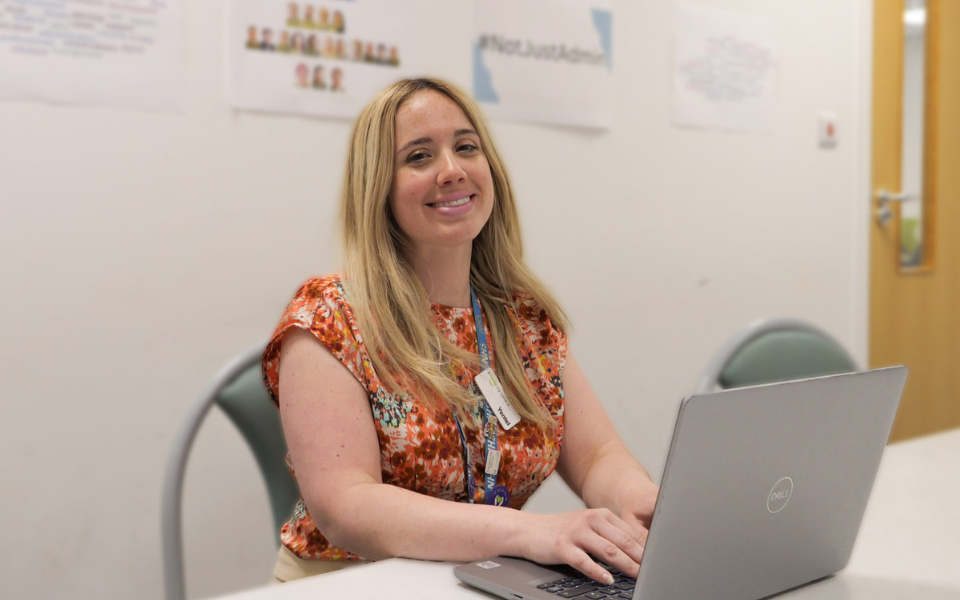
From Sports Coach to NHS Innovator: How Yentel Found Purpose at UHS
More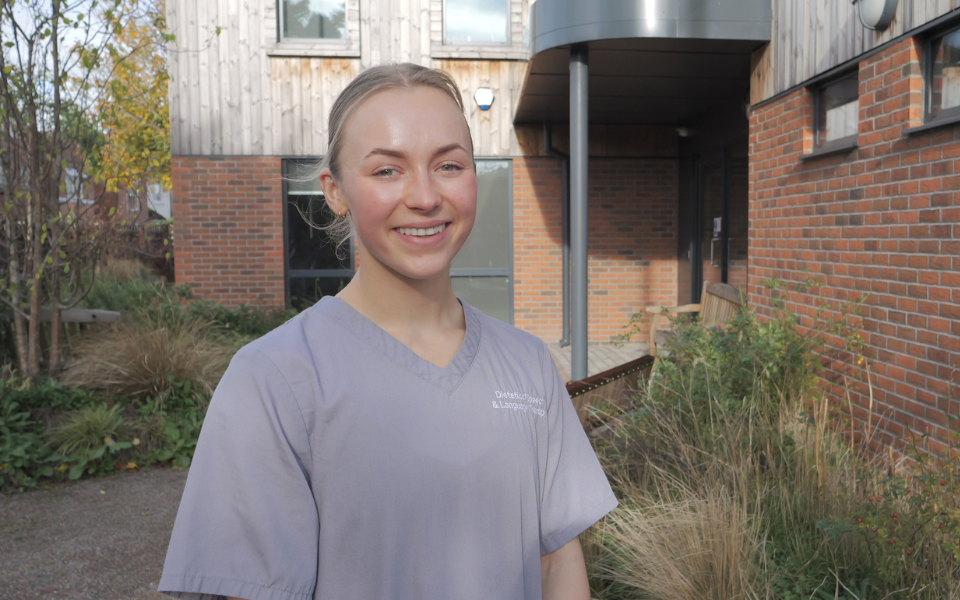
Supporting Newly Qualified Professionals: The Impact of Preceptorship at UHS – Goda’s Story
More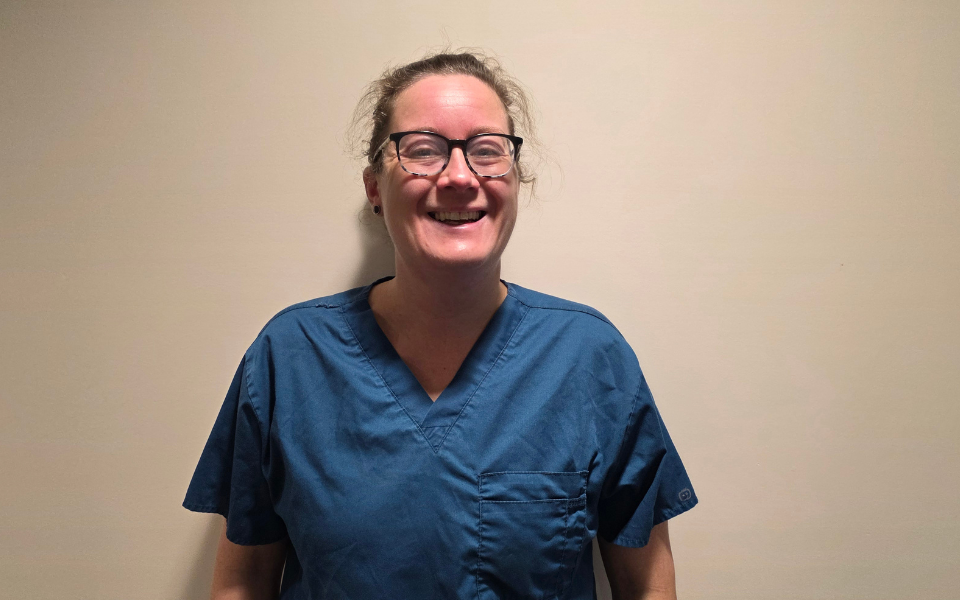
From Childhood Dream to NHS Specialist: Lizzi’s Journey in Pharmacy
More